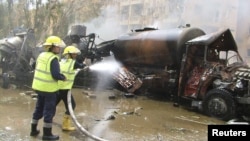A car-bomb exploded outside a Syrian state security compound in the eastern oasis town of Deir el-Zour Saturday, killing nine people and wounding 100 others. Syrian TV accused terrorists of the blast, which appears to have been the second major attack against a government security building in just under 10 days.
The explosion took place in the parking lot of a government military and air force intelligence compound in the oasis city near the Iraqi border.
Relatives of victims sobbed as they gathered at a local government hospital Saturday.
Damage
Syrian state TV showed video of buildings with their walls blown off and rubble lining the streets for several city blocks. Syrian media blamed a suicide car-bomber for the explosion and initially said that 1,000 kg of TNT were used in the blast.
A woman whose home was badly damaged from the explosion says the power of the blast sent debris flying all around her. She said that furniture, doors, and windows were blown off at her home, as well at homes nearby. Her daughter, she said, was injured and taken to a hospital.
Syrian TV showed members of a U.N. observer team visiting the scene of the blast. Foreign Ministry spokesman Jihad Makdissi accused “terrorists” as being responsible for the bombing at the Ghazi Ayash complex in Deir el-Zour, often a veiled reference to rebel fighters.
Responsibility
A spokesman for the rebel Free Syrian Army in Deir el-Zour denied responsibility. Omar Abu Layla told Radio Sawa that his group could “not physically have reached the site of the blast because of government security measures.” Another rebel commander told al Jazeera TV that the blast was a “pretext for the government to intervene in Deir el-Zour.”
Analyst Nadim Shehadi of Chatham House in London says uncertainty about who might be responsible for Saturday's blast, as well as other recent similar attacks seems to be paralyzing the international community and preventing it from taking action.
"It's a mind game. It's each side trying to prove its own merit, here, and confusing the West basically into inaction. [This is] the main reason why there is no clear policy on Syria," said Shehadi.
Blame
The opposition Syrian National Council and the government accused each other of being responsible for Saturday's blast, as well as the bloody twin-bombings in front of a government security compound in Damascus on May 10. A shadowy group calling itself the al-Nusra Front claimed responsibility for the earlier blasts in a recent video.
U.N. Secretary-General Ban Ki-moon indicated on Friday that al-Qaida “may be responsible” for the May 10 explosions. U.N. spokesman Ahmed Fawzi also pointed the finger at what he called a “third element.” Many analysts, however, remain skeptical about possible al-Qaida involvement in a number of deadly bombings since December.
The explosion took place in the parking lot of a government military and air force intelligence compound in the oasis city near the Iraqi border.
Relatives of victims sobbed as they gathered at a local government hospital Saturday.
Damage
Syrian state TV showed video of buildings with their walls blown off and rubble lining the streets for several city blocks. Syrian media blamed a suicide car-bomber for the explosion and initially said that 1,000 kg of TNT were used in the blast.
A woman whose home was badly damaged from the explosion says the power of the blast sent debris flying all around her. She said that furniture, doors, and windows were blown off at her home, as well at homes nearby. Her daughter, she said, was injured and taken to a hospital.
Syrian TV showed members of a U.N. observer team visiting the scene of the blast. Foreign Ministry spokesman Jihad Makdissi accused “terrorists” as being responsible for the bombing at the Ghazi Ayash complex in Deir el-Zour, often a veiled reference to rebel fighters.
Responsibility
A spokesman for the rebel Free Syrian Army in Deir el-Zour denied responsibility. Omar Abu Layla told Radio Sawa that his group could “not physically have reached the site of the blast because of government security measures.” Another rebel commander told al Jazeera TV that the blast was a “pretext for the government to intervene in Deir el-Zour.”
Analyst Nadim Shehadi of Chatham House in London says uncertainty about who might be responsible for Saturday's blast, as well as other recent similar attacks seems to be paralyzing the international community and preventing it from taking action.
"It's a mind game. It's each side trying to prove its own merit, here, and confusing the West basically into inaction. [This is] the main reason why there is no clear policy on Syria," said Shehadi.
Blame
The opposition Syrian National Council and the government accused each other of being responsible for Saturday's blast, as well as the bloody twin-bombings in front of a government security compound in Damascus on May 10. A shadowy group calling itself the al-Nusra Front claimed responsibility for the earlier blasts in a recent video.
U.N. Secretary-General Ban Ki-moon indicated on Friday that al-Qaida “may be responsible” for the May 10 explosions. U.N. spokesman Ahmed Fawzi also pointed the finger at what he called a “third element.” Many analysts, however, remain skeptical about possible al-Qaida involvement in a number of deadly bombings since December.




